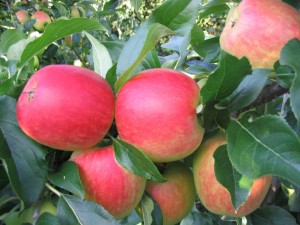Smallholders Handbook Part 7

Here is our seventh instalment about joining the Food Industry and living off the land with a sustainable smallholding.
At BigBarn we would love to promote thousands of profitable smallholdings on our UK Food Map to help reconnect people with where their food comes from and helping build inclusive, sustainable, communities around food.
To help here is the seventh of 12 extracts from Lorraine Turnbull’s book The Sustainable Smallholders’ Handbook
Money Growing on Trees
An orchard has the potential to produce a really substantial profit, depending on what you plant and what you do with it, and apples are one of the easiest fruits to grow.
But there’s more to an orchard than that. There’s something very rewarding about plucking a ripe, sun-warmed apple from a tree you planted and nurtured and watched blossom, and something timeless about the passage of the seasons in an orchard, marking family occasions there from christenings to weddings and even commemorating the passing of a loved one with the planting of a tree. And at the same time, you are almost literally watching money grow on trees.

Bumper crop of apples
Can’t use up or sell your whole crop? Then juice it, and what you don’t sell as delicious fresh juice you can always turn into cider. Contrary to myth, cider can be made with any old apples, and in eastern and south-eastern England it is. But if you really fancy cidermaking as a serious business then you will want some cider apple trees too.
I have grown mainly from MM106 stock which produces half-standards that aren’t unmanageably large at harvest and pruning time and start fruiting at five years old. How densely to plant depends on how good the soil, aspect, and shelter are (apple trees are prone to root damage from windrock and do need shelter belts).

Get cider made from apples not concentrate
Cider
After producing cider for ourselves for around five years, we took some advice from our very helpful EHO and went into commercial production on a small scale. Our aim was to make good craft cider from 100% local apple juice and sell it locally. In the main John and I did the pressing, but we had lots of helpers which made it much more fun. I used apples from around 40 trees of both cider and dessert fruit. At the most, I produced 4,000 litres. It was hard work, but I could easily make a good wage from it; and with a ready market locally I didn’t even have to think about internet sales. I produced six varieties ofcider, which let me hit just about all markets in the area. Much more about cider making and the rules and regulations and the all-important tax exemption in the book.
Tempted? You can read more over the next few months or buy Lorraine Turnbull’s book The Sustainable Smallholders’ Handbook available here